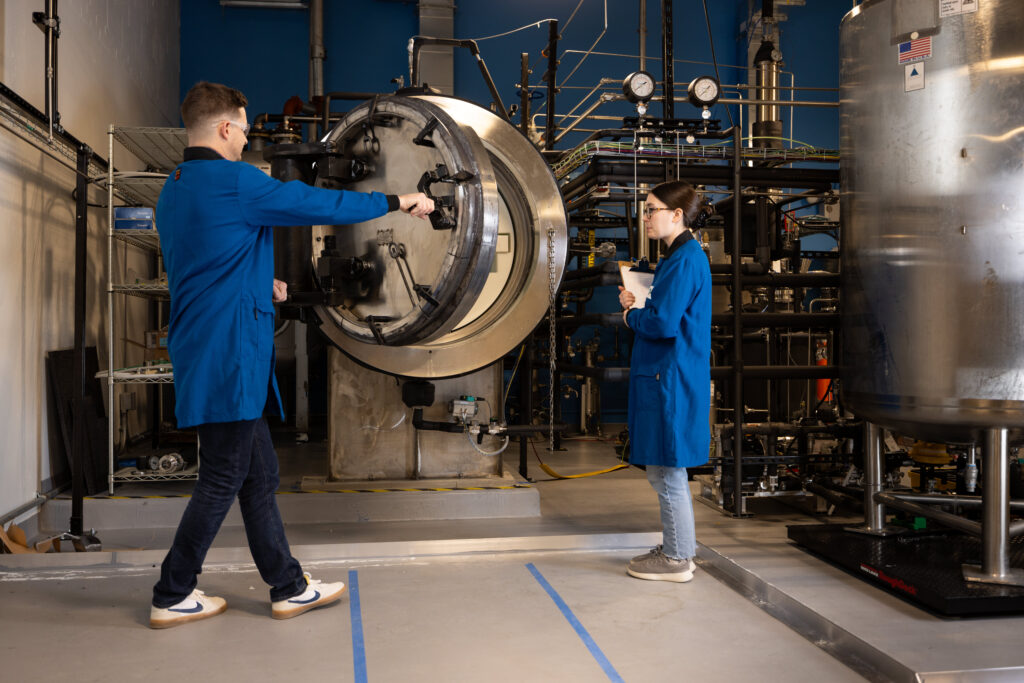
AeroShield’s new critical point dryer at its manufacturing facility in Waltham, Massachusetts. (Photo: Business Wire)
AeroShield Materials’ new critical point dryer is expected to help the company commercialize aerogel-insulated glass for improved thermal properties.
WALTHAM, Mass.—AeroShield Materials is on a mission to commercialize the manufacturing of aerogel-insulated glass to improve thermal properties of residential windows and doors. The company, an MIT spin-out that develops cutting-edge, energy-efficient products for the built environment, recently took what it called a “major step forward” by installing and commissioning a 25-ton, 10-foot-long critical point dryer at its manufacturing facility in Waltham.
The installation reportedly makes AeroShield one of a handful of companies worldwide to own and operate a dryer of such size. It also enables AeroShield to produce the first aerogel-insulated glass for entry and patio doors, the company said in a release.
“AeroShield’s scientific breakthrough means we are on the cusp of the next generation of energy-efficient windows,” said Aeroshield Materials CEO Elise Strobach, Ph.D., in the release. “For more than a decade, leading researchers have been trying to make large-scale aerogels that are transparent, because the benefits would be incredible. With this new critical point dryer, we intend to prove that it is not only possible but economically viable. It creates a whole new set of opportunities for fabricators, builders, architects, and homeowners.”
According to AeroShield, the critical point dryer performs a crucial step in enabling the patented nanostructure of AeroShield’s material. In the manufacturing process, super-critical extraction in the dryer transforms a wet, nanoporous gel into an ultra-clear, super-insulating aerogel sheet by removing all solvents from the material. The aerogel sheet is then bonded to glass, creating a super-insulating, aerogel coated glass product that is ready to be used in patio or entry doors as large as 32 inches by 73 inches.
“The aerogel is two to three times more insulating than the standard inert gases used to improve glass insulation performance in today’s residential window market,” said Aaron Baskerville-Bridges, co-founder and vice president of operations, in the release. “With the AeroShield technology, those same double-pane windows can be 40 percent thinner and lighter than triple-pane windows. Ultimately, the solution can translate into savings of thousands of dollars on a homeowner’s annual heating and cooling bills.”
The critical point dryer is part of AeroShield’s initial capital investment of nearly $5 million in its pilot manufacturing plant. At 12,000 square feet, the Waltham facility opened in the summer of 2024 and includes assembly lines, testing equipment, other manufacturing equipment, and R&D labs.
“Installing this critical point dryer and achieving larger sizes opens up a wide range of use cases,” Baskerville-Bridges added. “Entry and patio doors are just the start of AeroShield’s journey in decarbonizing windows. Residential windows, commercial windows, after-market retrofits, and even freezer doors or windows for vehicles could benefit from improved thermal performance.”
The milestone comes on the heels of an announcement from the U.S. Department of Energy (DoE), which named AeroShield as one of seven Phase I winners of the Building Envelope Innovation Prize in October 2024. The DoE accolade targets high-performance, cost-effective secondary glazing systems to improve the efficiency of commercial windows, the release stated.
AeroShield is a materials science company that has developed and scaled what it describes as “the world’s most transparent aerogels.” The aerogels are super-light, super-insulating materials that are reportedly more than 95 percent air.
